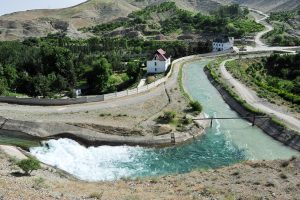الملاحظات التقييمية الرسمية على الحوارات إلى قمة الأمم المتحدة للنظم الغذائية لعام 2021
نوع الحوار
بدعوة من
لغة فعالية الحوار
التاريخ/الوقت
إلى:
المدينة
نطاق التركيز الجغرافي
التنسيق
يُرجى مراجعة التفاصيل أدناه للحصول على معلومات التسجيل إذا كانت متوفرة أو الاتصال بمنظم الحوار إذا كنت ترغب في الحضور.
القيّم
الوصف
Central Asia (Kazakhstan, Kyrgyzstan, Tajikistan, Turkmenistan and Uzbekistan) is considered one of the dynamic growing and developing region in the world. Population growth, socio-economic development, climate change, hydropower development as well as changing consumption patterns of the population contribute to increased demand for water, energy and food. Water scarcity presents one of the greatest challenges for the region as its population grows so does the need to create more jobs, produce more food, more energy – yet water resources are limited.
Irrigated agriculture consumes approximately 80% of all abstracted water in Central Asian countries. The region is well known for its history of mismanagement of water, energy, and land resources that have had widely publicized negative effects on water availability throughout the region. The Aral Sea, a large inland lake, almost disappeared as a result of diverting large portions of the Amu Darya and Syr Darya River flows to expand irrigated agriculture (due to in-efficient irrigation and irrational cropping pattern). Balancing the sectoral needs for agricultural production and the generation of energy through hydropower is challenging, as the transboundary water flow is disrupted. Climate change and population increases will put additional stress on the region’s water resources with 10 to 30% less water available in the aforementioned rivers by 2050.
Solutions for sustainable food production through irrigated agriculture require a systemic approach to assess benefits and trade-offs across sectors. Here, the water–energy–food (WEF) nexus has become an important concept in natural resource management. It has been conceptualized to analyze linkages and trade-offs between the three sectors, across temporal and spatial scales.
Taking into account, numerous challenges facing Central Asian countries to achieve security in all three sectors of WEF, application of a ‘Nexus’ approach allows for mutually beneficial responses that are based on an understanding of synergies between water, energy and agricultural systems policies and practices.
Expected key outcome of this dialogue would be getting involved and sharing the views of Central Asian stakeholders on sustainable irrigated foods systems transformation and importance of WEF nexus under climate uncertainties. Reaching a common understanding of the challenges and finding local solutions to the challenges facing food security/water systems transformation along with attendant issues of water security for a range of other sectors will be explored.
Participants: This dialogue is based on invitation and participants are expected from International and Regional Organizations, key line Ministries and Agencies of Central Asian States, Academies of Sciences, National Research Institutions, Basin Authorities of the region, NGOs, Private Sectors, Donor Agencies and other Development Partners including CG Centers.
Dialogue is expected to gather around hundred participants/stakeholders of the region and discuss topic in identified seven breakout working groups.
Language: simultaneous translation from English into Russian and vise-versa will be arranged by Organizers.
الشكر والتقدير


